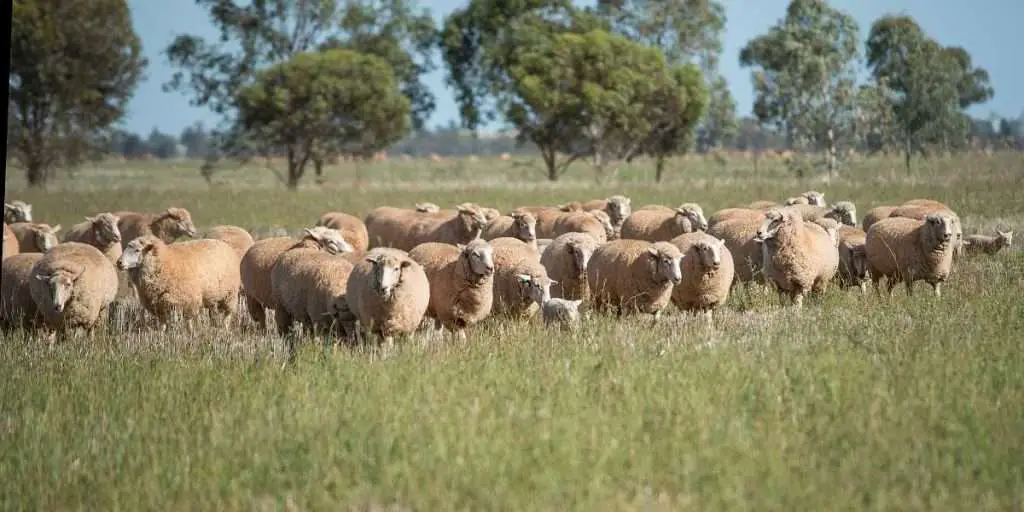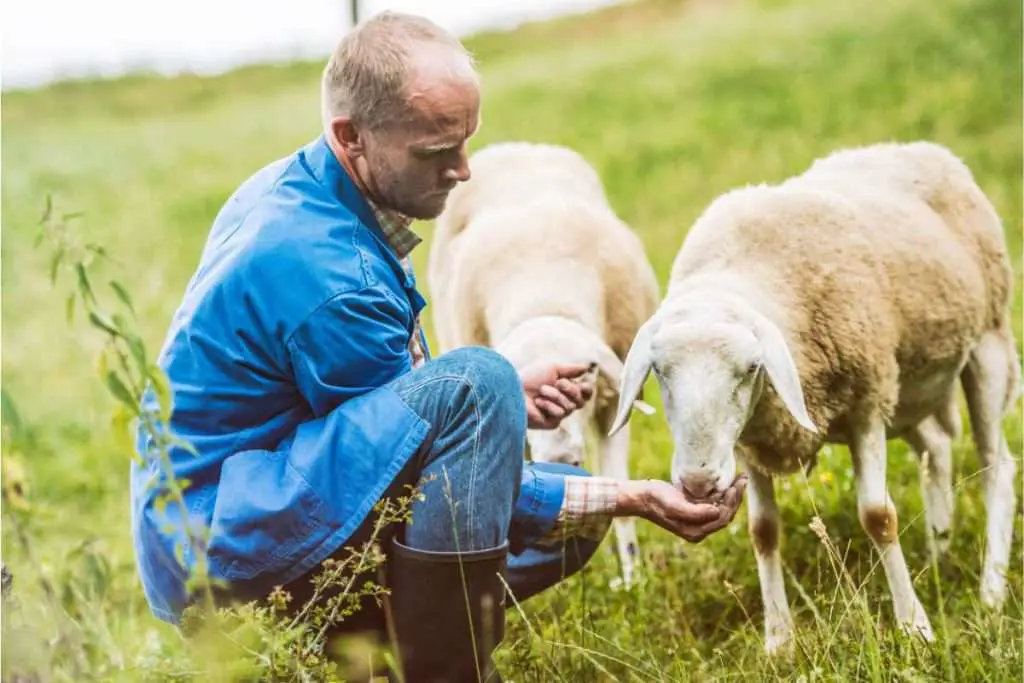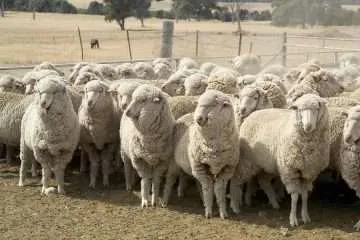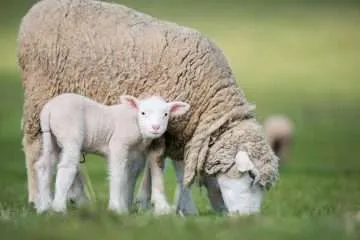Merino sheep, known for their high-quality wool, require a well-balanced diet to ensure optimal health, growth, and wool production.
As a shepherd, it’s essential to provide your flock with the best feed to keep them healthy and productive. In this comprehensive guide, I will discuss the best feed options for Merino sheep, including pasture management, supplemental feeds, and mineral and vitamin supplementation to achieve a balanced diet and promote overall health.
1) Optimal Pasture Management for Merino Sheep
1.1 Importance of High-Quality Forage
A Merino sheep’s diet primarily consists of forage, which includes pasture grasses and hay. High-quality forage is essential for providing energy, protein, and essential nutrients that are vital for the sheep’s growth, reproduction, and wool production.
Therefore, focusing on pasture management is the first step towards achieving a healthy diet for your Merino sheep.

1.2 Rotational Grazing
Rotational grazing involves dividing your pasture into smaller sections or paddocks and allowing the sheep to graze on one paddock at a time.
This method promotes even grazing, prevents overgrazing, and allows forage to recover and regrow. Rotational grazing also reduces the risk of parasites and increases the overall quality and quantity of forage available to your sheep.
1.3 Fertilizing Pastures
Fertilizing pastures with the appropriate nutrients helps maintain the nutrient content of the forage, resulting in better quality feed for your sheep.
Regular soil testing can guide you in determining the right type and amount of fertilizer needed to optimize your pasture’s growth and nutrient content.
2) Supplemental Feeds for Merino Sheep
While high-quality forage should be the foundation of a Merino sheep’s diet, there are instances when supplemental feeds may be necessary to meet the sheep’s nutritional requirements.
2.1 Grain and Concentrate Feeds
Grain and concentrate feeds, such as corn, barley, oats, and wheat, can provide additional energy and protein when forage quality is insufficient.
These feeds can be especially beneficial during periods of rapid growth, pregnancy, lactation, or when preparing sheep for breeding or showing. However, it’s essential to introduce grains gradually to avoid digestive upsets and to monitor the amount provided to prevent overfeeding and obesity.
2.2 Protein Supplements
Protein supplements, such as soybean meal, cottonseed meal, or canola meal, can be used to increase the protein content of the diet when forage quality is low or during periods of increased protein demand.
Protein supplementation can help support growth, reproduction, and wool production in Merino sheep.
2.3 Silage and Haylage
Silage and haylage are fermented forage products that can be used as a supplemental feed for Merino sheep.
They are particularly useful during the winter months or when fresh pasture is limited. Silage and haylage can provide a consistent supply of high-quality forage, helping to maintain the sheep’s nutritional needs during times of forage scarcity.
Mineral and Vitamin Supplementation for Merino Sheep
3.1 Essential Minerals
Minerals are vital for various physiological processes in Merino sheep, such as bone and teeth formation, enzyme function, and energy metabolism.
Key minerals include calcium, phosphorus, magnesium, potassium, sodium, sulfur, iron, zinc, copper, manganese, selenium, and iodine. Providing a mineral supplement, free-choice mineral block, or mineral-rich forage can help meet your sheep’s mineral requirements.

3.2 Essential Vitamins
Vitamins play a crucial role in many metabolic processes and are necessary for maintaining good health in Merino sheep.
The most important vitamins for sheep include vitamins A, D, E, and K. While sheep can synthesize some vitamins from their diet, others may need to be supplemented to ensure optimal health and growth.
3.2.1 Vitamin A
Vitamin A is crucial for maintaining healthy skin, eyes, and immune function. Sheep can obtain vitamin A from carotene found in fresh green forage.
However, during winter months or periods of drought, when fresh forage is limited, it’s important to provide a vitamin A supplement to maintain adequate levels.
3.2.2 Vitamin D
Vitamin D is essential for calcium and phosphorus metabolism, playing a vital role in bone development and maintenance.
Sheep can synthesize vitamin D when exposed to sunlight, but during winter months or in regions with limited sunlight, supplementation may be necessary to prevent deficiencies.
3.2.3 Vitamin E
Vitamin E is a powerful antioxidant that helps protect cells from damage and supports immune function. It also plays a role in maintaining healthy muscle and nerve function.
Sheep can obtain vitamin E from fresh green forage, but supplementation may be required during periods of limited forage availability or for sheep with higher nutritional demands, such as pregnant or lactating ewes.
3.2.4 Vitamin K
Vitamin K is essential for blood clotting and bone metabolism.
Sheep can synthesize vitamin K from their diet, but supplementation may be necessary in certain situations, such as when feeding low-quality forage or when using certain medications that interfere with vitamin K absorption.
4) Monitoring and Adjusting Feed Intake
To ensure that your Merino sheep receive the best nutrition possible, it’s important to monitor their feed intake and make adjustments as needed.
Factors such as age, body weight, stage of production, and environmental conditions can all affect a sheep’s nutritional requirements.
4.1 Body Condition Scoring
Body condition scoring (BCS) is a useful tool for monitoring the nutritional status of your Merino sheep. It involves assessing the amount of fat and muscle covering the backbone and ribs.
Regularly monitoring the BCS of your sheep can help you identify any nutritional imbalances and make appropriate adjustments to their diet.
4.2 Adjusting Feed Based on Nutritional Demands
Different stages of production, such as growth, pregnancy, lactation, and wool production, require different nutrient levels.
Be prepared to adjust your sheep’s diet according to their changing nutritional needs to maintain optimal health and productivity. This may involve increasing or decreasing the amount of forage, grain, or supplements provided.
Summary
Successfully nurturing a thriving Merino sheep flock involves a comprehensive understanding of their nutritional requirements and implementing strategies to meet these needs.
Ensuring optimal pasture management, providing supplemental feeds when necessary, and offering appropriate mineral and vitamin supplementation will support the health, growth, and wool production of these valuable animals.
By diligently monitoring and adjusting feed intake based on your sheep’s changing needs, you will create a sustainable and profitable environment for your Merino flock. Ultimately, the investment in your sheep’s nutrition will pay off in the form of superior wool quality, better reproductive performance, and overall flock health.
Related Topics:
What is the Role of the Merino Sheeps in Regenerative Agriculture Practices?
The Amazing Adjustability of Merino Sheeps: Thriving Across Diverse Climates
Decoding Merino Sheeps: A Comprehensive Guide to the Body Condition Scoring System
What are successful Weaning Practices for your Merino Sheep Lambs
Merino Sheep: Popular Breed Associations and Registries
All about Flystrike Prevention and Treatment: Protecting the Merino Sheep



0 Comments